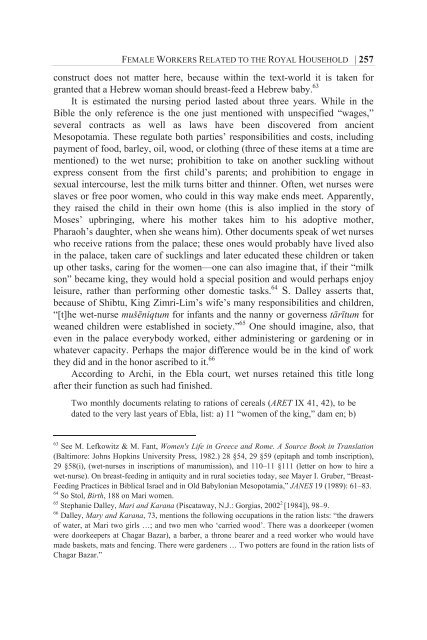Women at Work in the Deuteronomistic History - International Voices ...
Women at Work in the Deuteronomistic History - International Voices ...
Women at Work in the Deuteronomistic History - International Voices ...
You also want an ePaper? Increase the reach of your titles
YUMPU automatically turns print PDFs into web optimized ePapers that Google loves.
FEMALE WORKERS RELATED TO THE ROYAL HOUSEHOLD | 257<br />
construct does not m<strong>at</strong>ter here, because with<strong>in</strong> <strong>the</strong> text-world it is taken for<br />
granted th<strong>at</strong> a Hebrew woman should breast-feed a Hebrew baby. 63<br />
It is estim<strong>at</strong>ed <strong>the</strong> nurs<strong>in</strong>g period lasted about three years. While <strong>in</strong> <strong>the</strong><br />
Bible <strong>the</strong> only reference is <strong>the</strong> one just mentioned with unspecified “wages,”<br />
several contracts as well as laws have been discovered from ancient<br />
Mesopotamia. These regul<strong>at</strong>e both parties’ responsibilities and costs, <strong>in</strong>clud<strong>in</strong>g<br />
payment of food, barley, oil, wood, or cloth<strong>in</strong>g (three of <strong>the</strong>se items <strong>at</strong> a time are<br />
mentioned) to <strong>the</strong> wet nurse; prohibition to take on ano<strong>the</strong>r suckl<strong>in</strong>g without<br />
express consent from <strong>the</strong> first child’s parents; and prohibition to engage <strong>in</strong><br />
sexual <strong>in</strong>tercourse, lest <strong>the</strong> milk turns bitter and th<strong>in</strong>ner. Often, wet nurses were<br />
slaves or free poor women, who could <strong>in</strong> this way make ends meet. Apparently,<br />
<strong>the</strong>y raised <strong>the</strong> child <strong>in</strong> <strong>the</strong>ir own home (this is also implied <strong>in</strong> <strong>the</strong> story of<br />
Moses’ upbr<strong>in</strong>g<strong>in</strong>g, where his mo<strong>the</strong>r takes him to his adoptive mo<strong>the</strong>r,<br />
Pharaoh’s daughter, when she weans him). O<strong>the</strong>r documents speak of wet nurses<br />
who receive r<strong>at</strong>ions from <strong>the</strong> palace; <strong>the</strong>se ones would probably have lived also<br />
<strong>in</strong> <strong>the</strong> palace, taken care of suckl<strong>in</strong>gs and l<strong>at</strong>er educ<strong>at</strong>ed <strong>the</strong>se children or taken<br />
up o<strong>the</strong>r tasks, car<strong>in</strong>g for <strong>the</strong> women—one can also imag<strong>in</strong>e th<strong>at</strong>, if <strong>the</strong>ir “milk<br />
son” became k<strong>in</strong>g, <strong>the</strong>y would hold a special position and would perhaps enjoy<br />
leisure, r<strong>at</strong>her than perform<strong>in</strong>g o<strong>the</strong>r domestic tasks. 64 S. Dalley asserts th<strong>at</strong>,<br />
because of Shibtu, K<strong>in</strong>g Zimri-Lim’s wife’s many responsibilities and children,<br />
“[t]he wet-nurse mušēniqtum for <strong>in</strong>fants and <strong>the</strong> nanny or governess tārītum for<br />
weaned children were established <strong>in</strong> society.” 65 One should imag<strong>in</strong>e, also, th<strong>at</strong><br />
even <strong>in</strong> <strong>the</strong> palace everybody worked, ei<strong>the</strong>r adm<strong>in</strong>ister<strong>in</strong>g or garden<strong>in</strong>g or <strong>in</strong><br />
wh<strong>at</strong>ever capacity. Perhaps <strong>the</strong> major difference would be <strong>in</strong> <strong>the</strong> k<strong>in</strong>d of work<br />
<strong>the</strong>y did and <strong>in</strong> <strong>the</strong> honor ascribed to it. 66<br />
Accord<strong>in</strong>g to Archi, <strong>in</strong> <strong>the</strong> Ebla court, wet nurses reta<strong>in</strong>ed this title long<br />
after <strong>the</strong>ir function as such had f<strong>in</strong>ished.<br />
Two monthly documents rel<strong>at</strong><strong>in</strong>g to r<strong>at</strong>ions of cereals (ARET IX 41, 42), to be<br />
d<strong>at</strong>ed to <strong>the</strong> very last years of Ebla, list: a) 11 “women of <strong>the</strong> k<strong>in</strong>g,” dam en; b)<br />
63 See M. Lefkowitz & M. Fant, <strong>Women</strong>'s Life <strong>in</strong> Greece and Rome. A Source Book <strong>in</strong> Transl<strong>at</strong>ion<br />
(Baltimore: Johns Hopk<strong>in</strong>s University Press, 1982.) 28 §54, 29 §59 (epitaph and tomb <strong>in</strong>scription),<br />
29 §58(i), (wet-nurses <strong>in</strong> <strong>in</strong>scriptions of manumission), and 110–11 §111 (letter on how to hire a<br />
wet-nurse). On breast-feed<strong>in</strong>g <strong>in</strong> antiquity and <strong>in</strong> rural societies today, see Mayer I. Gruber, “Breast-<br />
Feed<strong>in</strong>g Practices <strong>in</strong> Biblical Israel and <strong>in</strong> Old Babylonian Mesopotamia,” JANES 19 (1989): 61–83.<br />
64 So Stol, Birth, 188 on Mari women.<br />
65 Stephanie Dalley, Mari and Karana (Pisc<strong>at</strong>away, N.J.: Gorgias, 2002 2 [1984]), 98–9.<br />
66 Dalley, Mary and Karana, 73, mentions <strong>the</strong> follow<strong>in</strong>g occup<strong>at</strong>ions <strong>in</strong> <strong>the</strong> r<strong>at</strong>ion lists: “<strong>the</strong> drawers<br />
of w<strong>at</strong>er, <strong>at</strong> Mari two girls …; and two men who ‘carried wood’. There was a doorkeeper (women<br />
were doorkeepers <strong>at</strong> Chagar Bazar), a barber, a throne bearer and a reed worker who would have<br />
made baskets, m<strong>at</strong>s and fenc<strong>in</strong>g. There were gardeners … Two potters are found <strong>in</strong> <strong>the</strong> r<strong>at</strong>ion lists of<br />
Chagar Bazar.”




